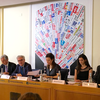Remembering the Liberation
This is the 70th anniversary of the liberation of Italy from the Nazi-Fascist yoke, and the celebrations are everywhere. As the ranks of those who were there begin to thin, the recollections of those who were there grow in importance. Here is one woman’s story of arresting an enemy soldier when she was just 15 years old – and its aftermath.
ROME – This is the 70th anniversary of the liberation of Italy from the Nazi-Fascist yoke, and the celebrations are everywhere. They begin, naturally, with the radio and TV, which has us all singing “Bella Ciao,” the beloved song of the partisans, all day long. The ranks of those remembering Liberation Day and those who were themselves part of it, as partigiani, begin to thin, and their recollections become all the more precious to those who came after.
The most touching from my point of view was the account by Nunzia Cavarischia, who is now 86 but was just 15 years old when she had to flee with her grandparents from the bombing of Rome. She was the daughter of anti-Fascist working class parents, and, as she relates, once Mussolini passing by in Rome caressed her cheek. “Get the muriatic acid and wash her face,” her father shouted in rage. She did not and remained a sweet, shy, pretty girl, who would wave and call “Ciao!” from her bicycle to the German soldiers, who had no idea that in her book bag were partisan documents, letters and even weapons.
On June 9, 1944, a group of partisan fighters set up a trap for two German trucks. They killed two Nazi soldiers, but a third, despite a leg injury, escaped. Nunzia set out to find him. Seeing a woman outside the door of her little house, Nunzia called softly, “Any German soldiers around here?” The woman froze, nodding her head slightly. Obviously there was.
Nunzia dashed inside the house. Indeed there he was, a giant of a man, lying on a bed with his injured leg up. He was armed: machine gun, pistol, two grenades. Only half aware of what she was doing, Nunzia kicked the gun away. Grabbing it, she pointed at him even though she had no idea of how to use a gun. He gave a sigh and sank back in pain. In Italian he said: “Here we are, even the children are against us now.”
When the real partisan fighters came to take him away, he muttered that Hitler had a “secret weapon.”
That was the end of their relationship until almost half a century later, when she was invited to a partisan reunion. “You know, this year a German who fought in this neighborhood is coming.” In fact, it was he. They took one look at each other, recognized one another, and – embraced, weeping tears of regret and joy at meeting again. Nunzia learned that Erich, the giant she had arrested, was Austrian, not German, from Innsbruck, and that the day they met he had been 24 years old. While an Italian prisoner of war he had met Nunzia’s father. The two had spoken often and, Erich related, “your father helped me understand so many things.” Until Erich died a year ago they wrote each other affectionate letters, she relates, and saw each other twice a year.
“We never spoke of the war. History wanted us enemies but we were friends.” –from La Repubblica, April 23, 2015





































i-Italy
Facebook
Google+
This work may not be reproduced, in whole or in part, without prior written permission.
Questo lavoro non può essere riprodotto, in tutto o in parte, senza permesso scritto.